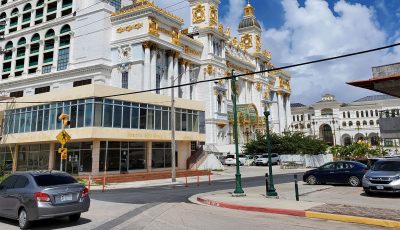ON MOTION TO DECLARE CNMI 2016 BUDGET UNCONSTITUTIONAL
OAG wants Judge Camacho prohibited from hearing issue

Camacho
The Office of the Attorney General filed yesterday a petition, asking the CNMI Supreme Court to prohibit Superior Court Associate Judge Joseph N. Camacho from proceeding with a hearing on a motion to declare the 2016 Budget Act unconstitutional.
Assistant attorney general David Lochabay, counsel for the CNMI government, asserted that Camacho should be prohibited from continuing with the case because the proceedings have become illegal and in excess of the trial court’s jurisdiction.
Lochabay presented two issues before the Supreme Court.
Lochabay said Camacho’s order directing plaintiffs Jotonia B. Aguon, Timothy Cruz, and Gorjonny Camacho, to file a standalone motion to declare the Commonwealth’s 2016 budget unconstitutional is clearly erroneous.
Second, the government counsel said, any proceedings in this case other than those specifically authorized by the statute (providing for orders in aid of judgment and hearings) exceed the trial court’s jurisdiction in this proceeding and are clearly erroneous.
Aguon and Cruz are holding a $35,000 judgment against the government in connection with their lawsuit over the death of their child.
Camacho is holding a $10,000 judgment against the government in connection with his medical malpractice lawsuit.
Camacho went to CHC for an appendectomy, but the surgeon instead allegedly used permanent stitches instead of dissolving stitches.
As a result, a skin nodule developed on the site of the surgery, causing him pain and forcing him to undergo a second surgery to remove the skin nodule and remove his stitches.
Attorney Michael Dotts is counsel for Aguon, Cruz, and Camacho in the two separate cases. The court consolidated the two cases.
To collect payment of the two judgments that were entered in 2013, Dotts filed motions for orders in aid of judgment. Dotts also asked the Superior Court to declare the 2016 Budget Act unconstitutional.
Camacho set an evidentiary hearing for May 9 to 11, 2016.
Dotts argued, among other things, that the Budget Act of 2016 is unconstitutionally unbalanced under the CNMI Constitution because it did not provide for the payment of judgments in a reasonable amount.
In OAG’s opposition file recently in the Superior Court, Lochabay said the trial court has no jurisdiction to hear the motion as the plaintiffs have no standing to assert the claims they made.
Lochabay said plaintiffs have no property right to payment of their judgments at any particular time, including through the 2016 Budget.
Lochabay also argued that plaintiffs specially requested judgments, which require legislative appropriations for payment instead of settlements, which may be paid without legislative appropriations.
In the government’s petition for prohibition filed yesterday in the CNMI Supreme Court, Lochabay said Camacho exceeded the court’s jurisdiction by ordering a hearing on whether the government’s current budget should be held unconstitutional.
Lochabay said Camacho issued an order to plaintiffs to file a standalone motion to declare the 2016 budget unconstitutional because he obviously felt that the court did not have the power to make such a finding under the statute.
“There is no other statutory source that would provide jurisdiction for the trial court to make such a finding,” he pointed out.
Lochabay said the only other source for such a power would seem to be the inherent powers doctrine.
Lochabay noted that even if the inherent powers doctrine was applicable it would not extend to authorizing a declaration that the 2016 budget is unconstitutional under the facts of this case.
He said there is no imaginable relationship between assisting plaintiffs in collecting their judgments and declaring the budget unconstitutional.
Lochabay said the government is being subjected to an illegal proceeding.
He said there is no statutory or common law basis for a post-judgment proceeding in a particular case to declare a law unconstitutional.
In addition, Lochabay said, a declaration that the 2016 budget is unconstitutional would result in a shutdown of all non-essential government services, to say nothing of the financial chaos that would result.



























